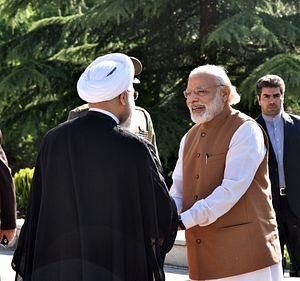In a remarkable display of New Delhi’s ability to balance competing interests in the Middle East, India will be hosting Iranian President Hassan Rouhani this week. He will be on a reciprocal visit after Prime Minister Narendra Modi’s visit to Tehran in 2016, which had resulted in a trilateral agreement on transit and transport between India, Iran, and Afghanistan. After Israeli Prime Minister Benjamin Netanyahu’s high profile visit to India last month and Modi’s visit to the Arab world this week, Rouhani would be hoping to galvanize Indo-Iranian ties, which remain relatively underwhelming.
Rouhani comes to India at a time when he is facing serious challenges domestically and globally. The Trump administration has repeatedly threatened Tehran with sanctions and has made clear its disdain for the Joint Comprehensive Plan of Action (JCPOA). Though Tehran has maintained a brave front, expecting the Europeans to challenge any move away from the nuclear pact, the economic impact of American threats on Iran is already visible. The nation’s currency, the rial, has lost a quarter of its value in six months. Domestically, the Rouhani government faced massive protests recently in numerous towns and cities, underlining deep-seated frustration with economic stagnation, mismanagement and corruption, and growing income inequality. Though the protest movement did not turn into a popular uprising, it laid bare the domestic tensions in Iran.
Rouhani will be looking at India primarily as an economic partner at a time when Iran needs investments to revive its economy. India has been a major buyer of Iranian oil and gas and the two nations continued to pursue trade ties even when Iran was globally isolated due to sanctions over its nuclear program between 2012 and 2016. Since the easing of Western sanctions, Iran has emerged as the third largest supplier of crude oil to India after Iraq and Saudi Arabia. Though it is gradually expanding, India-Iran bilateral trade stood at $12.89 billion in 2016-17.
India’s investment in Iran’s strategic port of Chabahar will give a much needed boost to bilateral trade, besides expanding India’s trade with Afghanistan and energy-rich Central Asia by circumventing Pakistan. India has committed $85 million for the development of the Shahid Beheshti port in Iran’s southeastern city of Chabahar and its first phase was inaugurated by Rouhani in December. The two nations are likely to sign an agreement allowing India to run operations in the first phase of the Chabahar port project during Rouhani’s visit this week.
But there are concerns in Iran that the project is not moving at a fast enough pace. This is partly due to uncertainty surrounding Washington’s approach toward Iran as Western banks remain reluctant to support Iran-based projects. Iran has also suggested that it is not averse to an eventual role for Pakistan and China in the project, something that would go contrary to India’s interests. The two nations have also been quibbling over delays in awarding a contract to develop a major gas field known as Farzad B in the Persian Gulf, which was discovered by an Indian consortium led by the state-run Oil and Natural Gas Corp. Iran has suggested that Indian terms being offered are not profitable. Divergences are also growing on the future of Afghanistan, with Iran increasingly looking at Russia and China to coordinate actions with Pakistan in managing the peace process.
India’s own stakes in the Arab world and Israel are growing at a time when new fault lines are emerging in the Middle East. Israel and the Sunni Arab world, worried about growing Iranian power, are closely coordinating their actions even as Tehran, with the help of its proxies, is intent on challenging the status quo. As New Delhi welcomes Rouhani, the two sides will be hoping to assuage each other’s concerns even as they will try to build a partnership that has often struggled to match the rhetoric surrounding it.

































